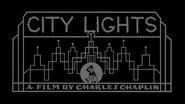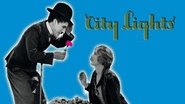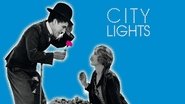Pluskylang
Great Film overall
Comwayon
A Disappointing Continuation
Nessieldwi
Very interesting film. Was caught on the premise when seeing the trailer but unsure as to what the outcome would be for the showing. As it turns out, it was a very good film.
Neive Bellamy
Excellent and certainly provocative... If nothing else, the film is a real conversation starter.
aishikaroy
World Greatest Actor Chaplin. So Good.You are amazing man
doranbriscoe
The timeless charm that Charlie Chaplin personifies through this film is at its greatest in this, his most graceful work of art. The genuine wit and humor mastered over the years is of course pervasive, but it ultimately plays second fiddle to the delicate eloquence of one of the most powerful love stories to ever grace the silver screen. This is the masterpiece Chaplin had been working towards his entire career, and it is executed incomparably.It is a peculiar thing to consider the title of the film, as the city and its lights don't seem to be an overtly prominent part of the picture. However, upon closer inspection, it truly is all about the city (society and its individuals) and its lights in a figurative sense, as lights in this film can very much refer to the beacons of hope that the individual characters serve as to each other. While the three main characters are just struggling to make it by in this world- to find purpose, to succeed- their own sense of worth in the eyes of society goes unmatched by the light they bring to those who need it.The millionaire's split personality as a suicidal drunkard (a social outcast) serves as the enlightened version of his character because in this state he is honest and mindful of those around him regardless of their status. His sober self, then, although admirable by society's standards, goes to show just how "blind" people are to the reality of how we should treat each other. The blind Flower Girl, of course, is incidentally only blind to the true nature of the Tramp when she can physically see. When she learns the truth, the "light" goes on for her ("Yes, I can see now"), and she can go back to seeing the true nature of an individual rather than their outward appearance. Thirdly, the Tramp is simply a bum meandering through life, until he finds a purpose. Naturally, it takes the city's lowest of the low- The Tramp- to be enlightened enough to see past a handicap and realize the true beauty of the Flower Girl, who is overlooked by the rest of society. As he becomes enlightened to the vitality of living selflessly, the Tramp receives the beacon of hope in return, grasping his dreams for love and a better way of life. Although very different individually, as these characters can see beyond society's little boxes they are each little pillars of light to illuminate the way for each other (something every city could use a lot more of). The Tramp and the Flower Girl, having their eyes opened and having found each other, display one of the most fulfilling of on-screen romances, for as once they were struggling through life individually, they have discovered more than they could ever hope and dream, together. City Lights is a love story of two outcasts, loners; until we find our light, aren't we all?
bcasey-08560
Charlie Chaplin's "City Lights" contains a blend of humor and humanity that make it memorable for everyone who watches it. Although made very much in the old-fashioned silent film tradition, much of it is timeless, too.After a few minutes of slapstick at the beginning, Charlie's "little tramp" character makes two acquaintances. He meets a blind girl selling flowers, who mistakes him for a rich man, and the two become very fond of each other. Then he meets a real millionaire, who is drunk, depressed, and about to commit suicide. In a comic scene, the tramp persuades the millionaire not to go through with it, making himself a devoted friend.The tramp soon learns that there is an operation that could give the girl her sight, and tries to think of some way he could help. His scenes with the girl and her grandmother are moving, while his determination to help lead him into some comic escapades - his attempt to win money in a boxing match being particularly funny, and one of Chaplin's best comic pieces. Meanwhile, when his millionaire friend is drunk, he dotes on the tramp, but when sober he forgets who the tramp is, leading to more amusing scenes and occasional trouble for Charlie.All of the comedy leads up to a finale that is one of the best-remembered scenes in any film. "City Lights" shows the power of the camera in the hands of a master, who without words can move his audience or make them laugh. Anyone who appreciates good cinema should see it at least once.
Anssi Vartiainen
The Tramp, once again played brilliantly by Charlie Chaplin, returns to live out his life in the hands of whimsy and general good luck. This time the stage is the city where our lovable scamp has to contend with alcoholic millionaires with bad memories, boxing opponents that keep changing and changing, grumpy butlers and enchanting flower girls.In have to admit that I find myself comparing these silent funny films to each other more than anything else. And why not, they're almost the same. They're all good, I'll give them that, but the plots are often almost identical. The Tramp is introduced, followed by some physical comedy, The Tramp meets a girl, physical comedy, The Tramp does something stupid to impress the girl, physical comedy, and a happy ending. It is all very well done, but is it any wonder that these movies start to blend with one another in my mind.That being said, this is the best Chaplin film I've seen so far. Because while the rather detached comedy sessions are still there, the central characters and the central romance are both brilliant. Harry Myers is very good and funny as the millionaire, but it's the growing and tested romance between Chaplin and the flower girl played by Virginia Cherrill that keeps us interested. Especially the ending scene, which is called one of the best romantic scenes ever. And rightfully so.They say City Lights is the one film you should see if you haven't seen any Charlie Chaplin in your life.Yeah, I can't argue with that.





